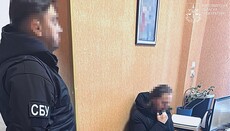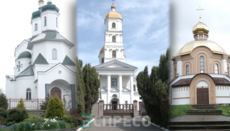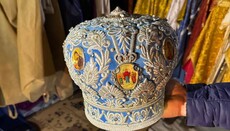Hierarch of Jerusalem names the key condition to overcome schism in Ukraine

Metropolitan Timothy of Vostra, Exarch of the Holy Sepulcher in Cyprus, stated that the UOC worthily carries its ministry under the omophorion of its Primate.
This opinion was expressed by the representative of the Jerusalem Orthodox Church at the celebrations on the occasion of the 30th anniversary of the revival of monasticism in the Holy Dormition Kiev-Pechersk Lavra, according to the Information and Education Department of the UOC.
"The Orthodox Church always prays for the unification of all," Metropolitan Timothy of Vostra said. “This is the commandment of the Lord that all should be one. If we are Orthodox, we should not lose our efforts to approach each other and be one. But, according to the commandment of Christ, this must be the human will. As for the split in Ukraine, this is a disappointing phenomenon. Different scenarios are voiced concerning the unification of the Church. In Ukraine, the Orthodox Church carries on its service under the omophorion of His Beatitude Metropolitan Onufry, whom all Orthodox Churches recognize and have liturgical communion with him. His spirituality and love for prayer and the Church are the factors that will help unite Orthodox Ukraine. He must continue this mission and be open to everyone who wants to unite."
The hierarch of the Jerusalem Church also called the main condition for overcoming the split.
"Undoubtedly, the unification of the Orthodox Church in Ukraine will be all welcome provided it is implemented in a canonical way," Metropolitan Timothy said. “An issue of canonicity belongs to the competence of the Pan-Orthodox Church, which throughout the centuries has developed relevant canons, approved by the Ecumenical Councils of the Church. Unification must be approached with humility, pursuing only benefits for the Church rather than personal gains. Today's world is full of temptations. Therefore, the condition for unification must be love for the Church, humility and the exclusion of personal interests or desire for power."
Vladyka reminded that state and church interests do not always coincide.
"From the history of the Church we have the experience that public administration is powerful and can do whatever they want, as it was during the times of the Soviet Union," said the Metropolitan. “The authorities then thought that the correct decision was to close all the churches, drive out and kill hundreds of clergymen, bishops and ordinary believers. But it turned out to be wrong. Time passed, and history condemned their actions. It is important to understand that the state pursues its interests, which change with time, under the influence of circumstances. But the Church lives its own life, has its own spiritual direction, which is not influenced or altered by secular circumstances and conditions."





